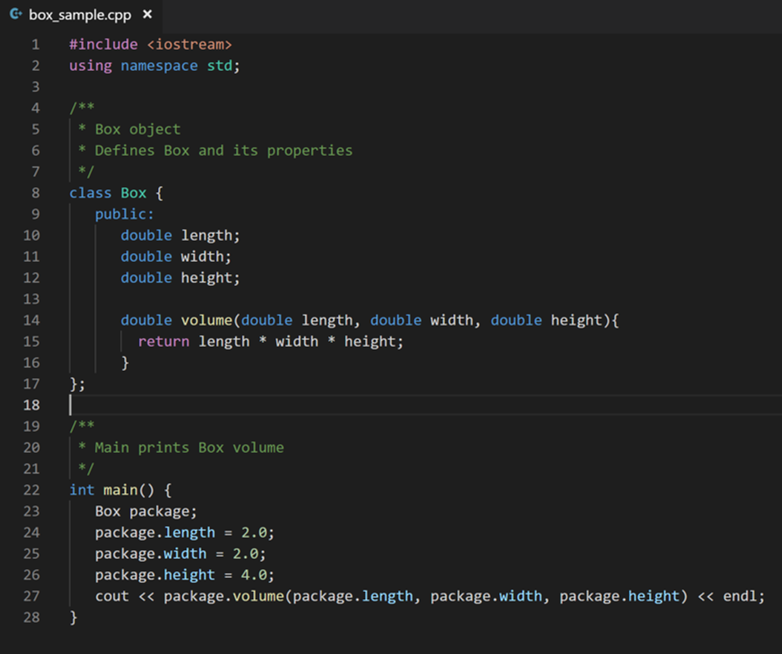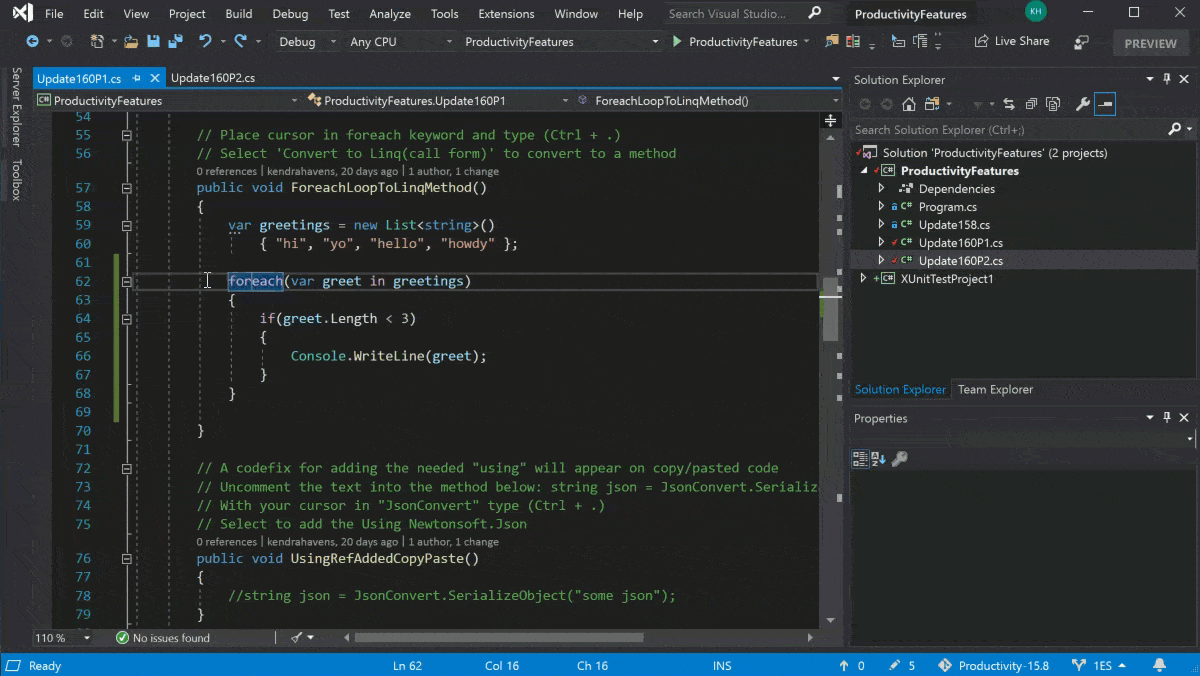- Visual Studio Code Debug C Program
- Visual Studio Code For C Programming
- Visual Studio Code Compile C Program
- C# Visual Studio Tutorial
- Visual Studio Code C Programming Windows
- Visual Studio Code C Programming Linux
- C Programming On Visual Studio Code
Gourav Goyal
By the end of this short guide, you’d be able to run, debug, and get IntelliSense for C/C++ files in VSCode. Though, this guide is focused on the Windows platform but can be extended to Mac and Linux with some minor changes.
I installed Visual Studio 2019 and I want to create a C project. Not C and not C# There is no option for a C solution But the doc says VS is both a C and a C compiler. I see no option for a C solution. There is a doc on the net explaining how to create C project in console from command line. Install Visual Studio Code. Install the C/C extension for VS Code. You can install the C/C extension by searching for 'c' in the Extensions view (Ctrl+Shift+X). In this video i tried to Compile and run c program using visual studio code with MinGWsteps i took in this video is1.) First i Compiled and Run in visual stu. In this video, I will show you the proper way to create C programs using Visual Studio 2019 For more in depth learning on C programming with Visual Studio, c. Coding C in Visual Studio: Start a new project, go under C and select Empty Project, enter the Name of your project and the Location you want it to install to, then click Ok. Now wait for the project to be created. Next under Solutions Explorer right click Source Files, select Add, then New Item.
I extensively used C & C++ in my competitive programmingyears and wanted better support for debugging & IntelliSense. The only options availablewere Dev-C++ (outdated) and the original 'Mammoth'Visual Studio. Lately, I found VSCode and fell in love with it (first love was Atom).I tweaked it around and set it up as a complete IDE For small C, C++ projects especiallygeared towards competitive programming.
Create a sample C/C++ project
- Open/Create an empty folder in VSCode.
- Create a
new.cppfile inside it like below:
- Install recommended C/C++ extension in VSCode and reload.

Install C/C++ Compiler
C/C++ extension does not include a C++ compiler. So, you will need to install one or use which is already installed on your computer.
Windows: Download MinGW64.zip (latest release) and extract it to the C Drive.

Mac:XCode
Linux:GCC
Also, Make sure to add C++ compiler PATH to environment variable of your platform. For Windows MinGW64 add: C:MinGW64bin
Run and Debug C/C++ Code
You’ll notice that there is also a .vscode folder in your sample project. To configure debug configuration, 2 files are required launch.json and tasks.json inside .vscode folder.
VSCode can create and auto-configure these files if we try to debug for the first time. To do that, open C++ file in VSCode and either hit F5 or go to Debug -> Start Debugging and select C++ (GDB/LLDB) then select g++.exe build and debug active file.
This should create 2 files launch.json and tasks.json in .vscode folder which should look like below (update the MinGW64 path if not correct)
Notice that I’ve added one more optional configuration g++ build & run active file in launch.json and g++ build & run in tasks.json file for purpose of also Running C/C++ code without debugging. Now you may choose which configuration to pick when you start debugging. You may remove the configuration whichever you won’t need.
launch.json
tasks.json
externalConsole in launch.json can be set to true to see code output in cmd instead.
Restart VSCode to take effects of newly added compiler paths.
Open any C/C++ file, set some breakpoints (or not), and hit the Big Green Play Button.
(Shortcut to debug: F5 )
Tip: To hide *.exe files in the side explorer of VSCode, open settings and paste the below config:
Thanks for reading. Would love to hear your thoughts about it. Connect with me onTwitter andLinkedIn.
The C# support in Visual Studio Code is optimized for cross-platform .NET Core development (see working with .NET Core and VS Code for another relevant article). Our focus with VS Code is to be a great editor for cross-platform C# development.

VS Code supports debugging of C# applications running on either .NET Core or Mono.
For detailed instructions on:
- .NET Core debugging - see the Microsoft C# extension's GitHub page.
- Mono debugging - see the Mono Debug extension's README.
Note:VS Code has limited support for debugging applications running on the Desktop .NET Framework.
Due to this focus, many standard C# project types are not recognized by VS Code. An example of a non-supported project type is an ASP.NET MVC Application (though ASP.NET Core is supported). In these cases, if you want to have a lightweight tool to edit a file - VS Code has you covered. If you want the best possible experience for those projects and development on Windows in general, we recommend you use Visual Studio Community.
Installing C# support
C# language support is an optional install from the Marketplace. You can install it from within VS Code by searching for 'C#' in the Extensions view (⇧⌘X (Windows, Linux Ctrl+Shift+X)) or if you already have a project with C# files, VS Code will prompt you to install the extension as soon as you open a C# file.
Roslyn and OmniSharp
Visual Studio Code uses the power of Roslyn and OmniSharp to offer an enhanced C# experience. We offer support for:
- .NET Core projects
- MSBuild projects
- C# scripts (CSX)
Lifeview wdm tv tuner drivers download for windows 10, 8.1, 7, vista, xp. On startup the best matching projects are loaded automatically but you can also choose your projects manually. The status bar will show what projects have been loaded and also allows you to select a different set of projects. To do so, click on the status bar projects item and select Change projects…. In the image below a single project has been picked up:
The available options include:
- Selecting a
project.jsonfile will open a .NET Core project and VS Code will load that project plus the referenced projects. - Selecting a
*.slnfile opens a MSBuild-project. It will load the referenced*.csprojprojects and sibling or descendantproject.jsonfiles but no other project files that are referenced from the solution file. - Selecting a
folderwill make VS Code scan for*.sln,project.jsonand*.csxfiles (C# scripts) and VS Code will attempt to load them all.
Once the project is loaded the enhanced experiences light up..
Editing Evolved
There is a lot to discover with C# and the editor, such as format on type, IntelliSense, the rename-refactoring, etc.
Visual Studio Code Debug C Program
For a full description of our editing features, go to the Basic Editing and Code Navigation documentation.
Here are a few highlights..
IntelliSense
IntelliSense just works: hit ⌃Space (Windows, Linux Ctrl+Space) at any time to get context specific suggestions.
Snippets for C#
We have several built-in snippets included in VS Code that will come up as you type or you can press ⌃Space (Windows, Linux Ctrl+Space) (Trigger Suggest) and we will give you a context specific list of suggestions.
Tip: You can add in your own User Defined Snippets for C#. Take a look at User Defined Snippets to find out how.
Search for Symbols
There are also features outside the editor. One is the ability to search for symbols from wherever you are. Hit ⌘T (Windows, Linux Ctrl+T), start typing, and see a list of matching C# symbols. Select one and you'll be taken straight to its code location.
CodeLens
Another cool feature is the ability to see the number of references to a method directly above the method. Click on the reference info to see the references in the Peek view. This reference information updates as you type.
Note: Methods defined in object, such as equals and hashCode do not get reference information due to performance reasons.

Tip: You can turn off references information displayed in CodeLens with the editor.codeLenssetting.
Find References/Peek Definition
You can click on the references of an object to find the locations of its use in place without losing context. This same experience works in reverse where you can Peek the definition of an object and see it inline without leaving your location.
Quick Fixes / Suggestions
There are some basic quick fixes supported in VS Code. You will see a lightbulb and clicking on it, or pressing ⌘. (Windows, Linux Ctrl+.) provides you with a simple list of fixes/suggestions.
Next steps
Visual Studio Code For C Programming
Read on to find out about:
Visual Studio Code Compile C Program
- .NET Core Development - get up and running with cross-platform .NET
- Basic Editing - Learn about the powerful VS Code editor.
- Tasks - Use tasks to build your project and more.
- Debugging - Find out how to use the debugger with your project.
- Unity development - Learn about using VS Code with your Unity projects.
Common questions
My Project won't load
C# Visual Studio Tutorial
VS Code only supports a limited set of project types (primarily .NET Core). For full .NET project support, we suggest you use Visual Studio Community.
Visual Studio Code C Programming Windows
IntelliSense is not working
This is typically as a result of the current project type not being supported. You can see an indication in the OmniSharp flame in the bottom left hand side of the status bar.
How do I build/run my project?
VS Code supports tasks for build and natively understand the output of MSBuild, CSC, XBuild. Find out more in the Tasks documentation.
Visual Studio Code C Programming Linux

C Programming On Visual Studio Code
I'm missing required assets to build and debug C# in VS Code. My debugger says 'No Configuration'
The Visual Studio Code C# extension can generate the assets you need to build and debug. If you missed the prompt when you first opened a new C# project, you can still perform this operation through the Command Palette (View > Command Palette) by typing '.NET', and running .NET: Generate Assets for Build and Debug. This command will generate the necessary launch.json and tasks.json configuration files (under the .vscode folder).
